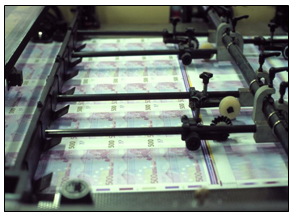By Bill Wilson
When he wrote the Wealth of Nations, Adam Smith warned against the “pretended payment” of sovereign debt, the creation of new money as a means of settling the debt. He wrote, “The raising of the denomination of the coin has been the most usual expedient by which a real public bankruptcy has been disguised under the appearance of a pretended payment.”
According to Smith, doing so still constituted a “real bankruptcy,” explaining, “The honour of a state is surely very poorly provided for, when, in order to cover the disgrace of a real bankruptcy, it has recourse to a juggling trick of this kind, so easily seen through, and at the same time so extremely pernicious.”
Last week, financial markets tanked amid a selloff of Portuguese debt that had pushed the interest rates on its bonds to over 7 percent. The fear became that Portugal would be unable to roll over some €1.25 billion of its debt at a January 11th auction.
Enter the European Central Bank (ECB), the troubled continent’s new purveyor of bailouts. Got a budget that can’t be balanced? Refuse to cut spending? Bond market’s got your balance sheet by the tail? Not to worry, the ECB is here to help.
The solution? The ECB printed billions of euros to buy Portugal’s bonds — and everyone pretended it was a real payment.
As reported by Bloomberg News on January 12th, “The European Central Bank spent between 1 billion euros ($1.3 billion) and 1.5 billion euros in government bonds in the last two days, according to Nomura International Plc estimates. The purchases were mostly of Portuguese government bonds, Nick Firoozye, head of interest-rate strategy at Nomura in London, said at a conference in Lisbon today.”
All told, the ECB bought €2.3 billion in government bonds that week, according to Reuters, in actions intended to calm markets against fears of default.
The ECB purchases were prior to the January 11th auction, and had the effect of slightly reducing interest rates on Portuguese debt. Then, when the auction came, the 10-year bonds sold, but at a still relatively high 6.72 percent interest rate.
The news was hailed by the government of Portugal as evidence that it did not need a bailout from the European Financial Stability Facility (EFSF). According to the New York Times, Portuguese officials described “the auction as a success that vindicated their strategy of financing its debt through the markets rather than requesting aid from Europe’s financial rescue fund.”
This is so much whistling past the graveyard. Everyone knows the only reason for the successful bond sale at a less-than-7-percent-rate is because the ECB is printing money to pay for Portugal’s debt. So, instead of getting its bailout from the EFSF, it got it from Europe’s central bank. Outraged taxpayers in Germany will likely see little difference.
So, what to make of Portugal’s essential lie that it does not need a bailout, when the ECB is busy giving it one?
Portugal’s Prime Minister Jose Socrates said it best, “We don’t need that help. We are able to do our work ourselves. We don’t need anything else than confidence.” The solution? Posture. Pretend everything is okay and hopefully the bond market will play along.
Meanwhile, those who work for a living wonder why it is they toil so hard to earn cash that these central bankers just print at will to finance wasteful governments that refuse to balance their budgets.
Portugal recently bragged that its annual budget deficit had been reduced to €12.5 billion, or 7.3 percent of its Gross Domestic Product (GDP). Whoop-tee-doo. With a debt of €143 billion at 83.3 percent of GDP, this is like a family whose annual income is $50,000 bragging it is only taking on $3,650 in new credit card debt that year — when the family already has $41,650 of credit card debt.
The only difference between that hypothetical family and the deadbeat governments is that the deadbeat governments can just print more money to make “pretended payments”. In the U.S. it is far worse: A $14 trillion national debt, about 95 percent of the $14.7 trillion GDP, and a $1.3 trillion annual deficit, 9.28 percent of GDP.
So far, the ECB has only bought €76.5 billion of government bonds via its lending facilities. Whereas, the Federal Reserve owns some $1.062 trillion of U.S. debt. And yet, 10-year Portuguese debt fetches 6.72 percent interest, while 10-year treasuries go for 3.3 percent.
Numbers like that are probably encouraging European central bankers at present to print even more money to make yet more pretended payments, since the apparent lesson is that markets favor a disguised bankruptcy over an avowed one. But don’t be fooled. As Smith notes, even disguised, it’s still a real bankruptcy — and he promised that it is “a practice which has brought either weakness or desolation into every country” that has ever tried it.
Bill Wilson is the President of Americans for Limited Government.


